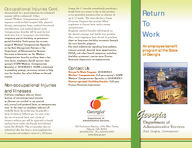Occupational Injuries Cont.
administered by a panel physician for jobrelated injuries will be authorized. Other covered Workers. Compensation medical expenses could include hospital bills, physical therapy, prescription drugs, medical/vocational rehabilitation, and medical-related travel. Compensation benefits will be paid for lost work time due to temporary total disability, temporary partial disability, or permanent partial disability. Each agency has its own assigned Workers' Compensation Specialist in the Risk Management Section at the Department of Administrative Services. For more information on the Workers. Compensation benefits resulting from a lost time claim, employees should contact their agency's DOAS Workers. Compensation Specialist at 404-656-6245. DOAS is dedicated to providing prompt, courteous service to help ease the burden that often follows on-the-job injuries.
Non-occupational Injuries
and Illnesses
Full-time employees who are absent because of non-occupational injuries or illnesses are entitled to use accrued sick, annual and personal leave, or compensatory time. In the event an employee exhausts all available leave, he or she may be granted a leave of absence without pay. In most cases, the use of accrued leave and a leave of absence without pay will be approved as family medical leave under the Family and Medical Leave Act (FMLA). The act provides that an individual who has been a state employee for 12 months and worked a total of 1,250 hours
during the 12 months immediately preceding a family leave can return to his or her position or an equivalent position after an absence of up to 12 weeks. The state also has a Leave Donation Program that permits fellow employees to donate leave under certain circumstances. Employee medical benefits will depend on the elected coverage and health care provider. Also, some employees have elected to purchase short- or long-term disability insurance through the state benefits program. For more information regarding leave policies, amount accrued, donated leave opportunities, FMLA, and other benefit programs, including disability retirement, contact your Human Resources department or representative.
Contact Us
Return-To-Work Program: 404-656-6245. Workers' Compensation: Call your agency's DOAS Workers' Compensation Specialist at 404-656-6245. Non-occupational Disability Benefits: Call your Human Resources department.
200 Piedmont Avenue, 1804 West Tower, Atlanta, GA 30334
404-656-5514 . Fax 404-651-9595 www.doas.ga.gov
Return To Work
An employee benefit program at the State of Georgia
Georgia
Administrative Services
Brad Douglas, Commissioner
Faster, Friendlier, Easier!
Department of Administrative Services
Return-to-Work Benefit Program
The goal of the Return-To-Work (RTW) benefit program is the safe return of employees to transitional or regular employment. Medical research has shown that people recover more quickly if they remain active and return to their normal routine as soon as possible, avoiding isolation and the mind-set of disability.
The RTW program offers an employee access to transitional duties that are approved by his or her physician. This could be as simple as a flexible schedule to permit attendance at medical/therapy appointments or an assignment to a special project that provides duties suited to reduced capacities.
As a participant in the RTW program, employees become an active part of the decision-making process related to the design of transitional employment. Employees. and Agency needs are best served when medically appropriate job tasks are provided to serve as a bridge to regular employment.
The RTW program also helps employees maintain their earnings. This is particularly important when an employee does not have enough sick or annual leave accrued to cover lost work time. In those circumstances, it
also helps employees maintain health insurance and other benefits that may be jeopardized by an extended absence. In addition, it can help maintain job security and retirement plans.
Transitional Employment
At the heart of the RTW process is Transitional Employment. The Transitional Employment team meets with an employee and his or her supervisor to design a plan that provides meaningful and medically approved temporary assignments. As an employee.s condition improves, the team may meet periodically to redesign the plan to increase activities. This might help an employee gain strength and endurance before returning to his or her regular position.
The RTW policy requires all team members to maintain medical confidentiality. As a member of the team, an employee is an active participant in the decision-making process and may be asked to help gather necessary documentation from his or her physician.
Permanent Restrictions
Unfortunately, there may be occasions when an employee never fully recovers from an injury or illness. In those situations, the team meets and looks at the essential job functions versus the permanent restrictions documented by the physician. In many cases, permanent restrictions do not affect an employee.s ability to do his or her job at full productivity. However, if the restrictions impact the essential job functions, attempts will be made to permanently accommodate the employee or locate another position within the Agency.
Occupational Inuries
The state makes every effort to provide a safe work environment. However, employees who incur injuries during the scope of their employment are covered by Workers. Compensation and are entitled to receive medical and compensation benefits. Georgia.s Workers. Compensation SelfInsurance Program covers all full-time, part-time, salaried, and hourly employees. Medical benefits are provided at 100 percent of the Georgia Workers. Compensation fee schedule when treatment is administered by an authorized physician. Each work site has posted a panel of physicians. The treatment
